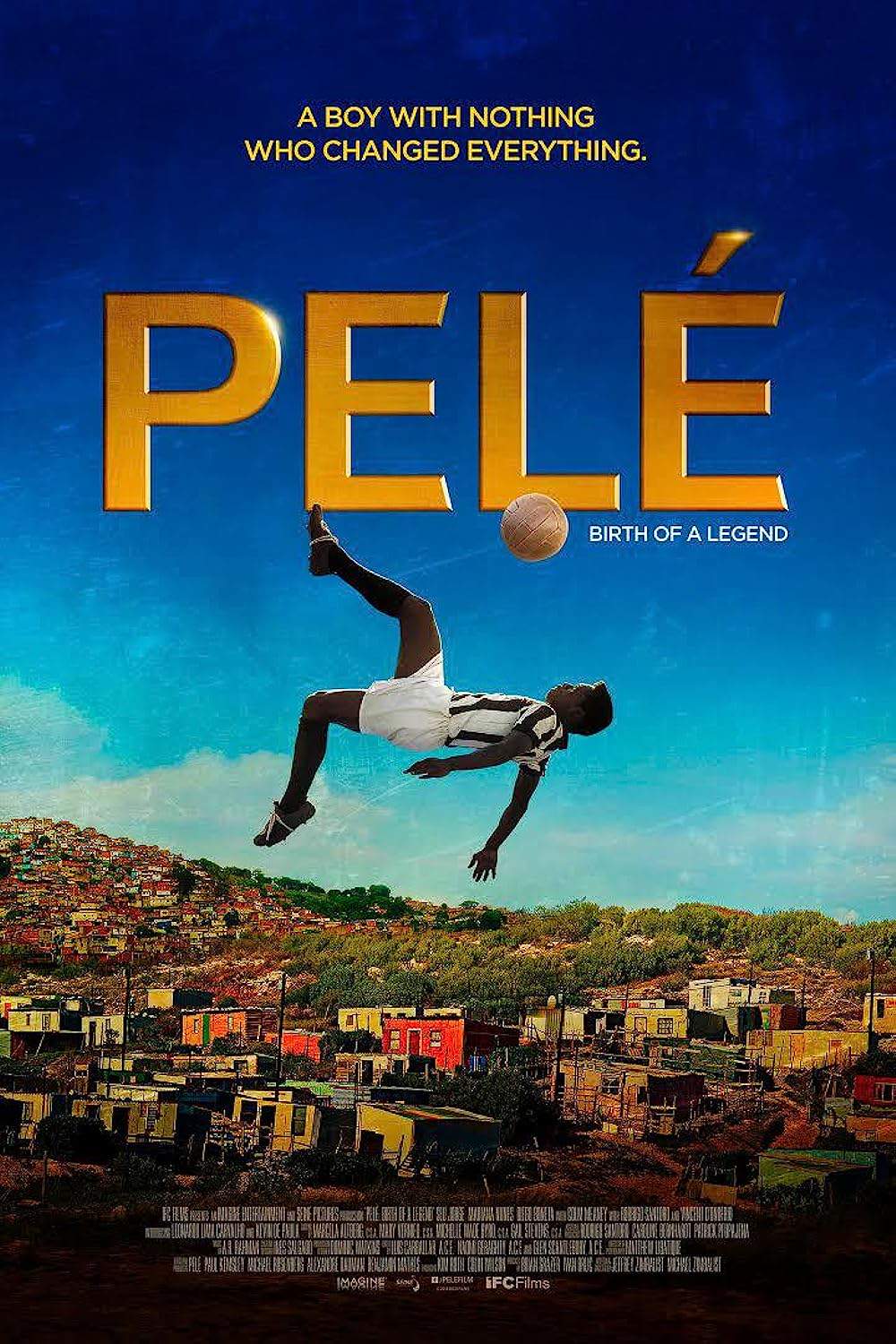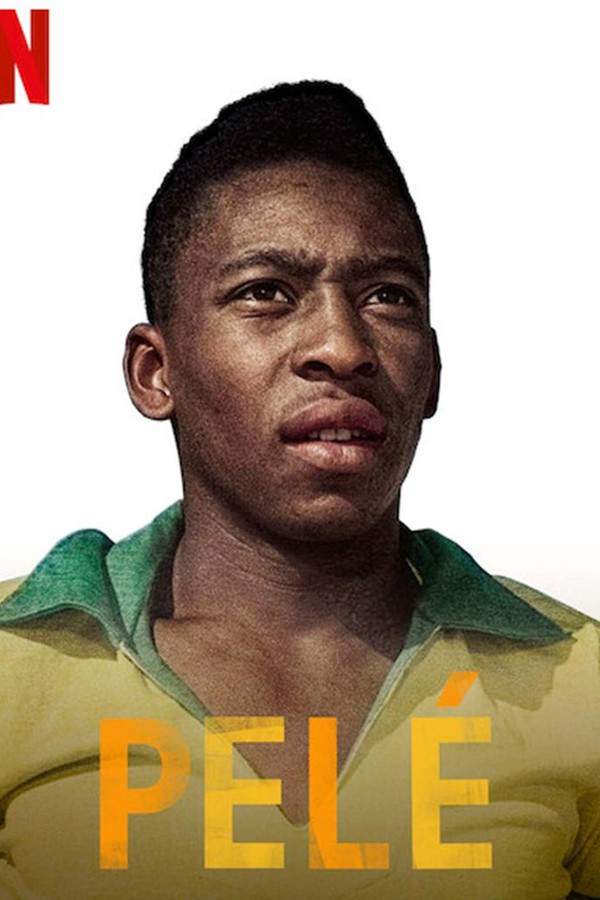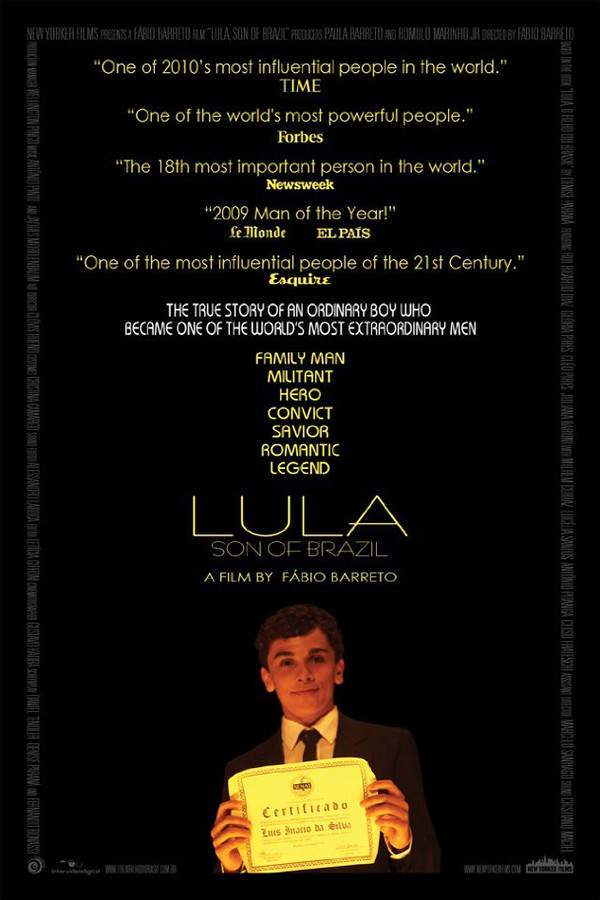
Pelé: Birth of a Legend 2016
Directed by

Jeff Zimbalist
Made by

IFC Films
Test your knowledge of Pelé: Birth of a Legend with our quiz!
Pelé: Birth of a Legend Plot Summary
Read the complete plot summary and ending explained for Pelé: Birth of a Legend (2016). From turning points to emotional moments, uncover what really happened and why it matters.
Under the mentorship of manager Vicente Feola, young Pelé (played by Kevin De Paula) rises to stardom, harnessing his unique street football talents to lead Brazil to an unexpected victory in the 1958 World Cup held in Sweden, facing off against the reigning Olympic champions, the Soviets.
The Brazilian team, which boasts a diverse and mixed-race lineup, finds itself navigating a series of hurdles, including a backdrop of injuries that complicate their journey toward the finals, ultimately relying on the skills of the 17-year-old reserve player.
Back in 1950, we meet Dico, whose full name is Edson Arantes do Nascimento. At this point in his life, he is a young boy hustling to make ends meet by polishing shoes. He and his friends play football with a makeshift ball made from discarded clothing. During this period, Brazil faces off in the World Cup final against Uruguay. His mother, Celeste, disapproves of Dico’s growing obsession with football and wishes for him to focus on supporting the family, which is struggling financially. In stark contrast, his father, Dondinho, a former footballer, encourages Dico’s aspirations.
The heartbreaking loss in the 1950 final, 2-1 to Uruguay, leaves a profound impact on Dico, who vows to his weeping father that he will one day secure the World Cup for Brazil. Celeste frequently reminds Dico of his father’s untapped potential in the beautiful game, which was tragically cut short by injury, forcing him to take up janitorial work.
While assisting his mother in cleaning a wealthy household, Dico learns that Waldemar De Brito, a former Brazilian footballer and scout, is searching for new talents for his club. Dico’s aspirations lead him to dream of becoming a player like Pelé, even though his friend José teases him with the nickname, which sticks over time.
José Altafini “Mazzola” (portrayed by Diego Boneta), comes from a wealthy family and takes pleasure in bullying Dico. During the selection trials, Dico’s team struggles financially, lacking proper footwear. Faced with defeat, Dico’s friend helps them secure some old shoes just in time for their match against José’s snobbish team.
The climactic final match sees Dico initially down 6-0, but with unwavering spirit and keen focus on his father in the audience, he plays barefoot and showcases his natural ability, bringing the score closer to 6-5 by the end. The buzz around Dico’s talent grows, catching the eye of Brito, who soon attempts to recruit him despite Celeste’s strong opposition. Following some tough training sessions with Dondinho, Pelé receives the chance he dreams of, joining the Santos football club at just 15 years old, despite initial struggles and a lack of confidence.
With Brito’s encouragement about the rich history of football, Pelé takes charge of his playing style, shaking off the shackles imposed by his coach. His phenomenal skills earn him a spot on both the junior and professional teams, eventually culminating in his selection for the Brazilian team in the 1958 World Cup—despite only being 16 years old.
As the team prepares, their coach, Feola, battles with the tension between adopting the traditional Ginga style versus modern European tactics, which had previously contributed to Brazil’s loss in the 1950 final. Pelé struggles with this balancing act but ultimately finds his rhythm again, leading to an inspiring series of performances.
In the decisive matches—the group stage against Austria, a tense game against England, and a challenging encounter with the Soviets—Pelé defies the odds while battling through physical limitations, demonstrating sheer determination. The semi-final against France proves to be a crucial turning point, as Pelé regains his confidence and plays true to his roots, scoring a hat-trick to lead Brazil to a 5-1 victory.
As they reach the final against Sweden, the local team is determined to neutralize Pelé’s influence. However, inspired by the support of the crowd, he channels the Ginga style, evading defenders and collaborating seamlessly with his teammates. With a thrilling performance that leads him to score two goals, Pelé helps Brazil secure a stunning 5-2 victory in the final.
By 1961, Pelé is hailed as a national treasure, going on to win two more World Cups in 1962 and 1970, and etching his name into history as the youngest player ever to win a World Cup at just 17 years old. He remains the only athlete to have achieved the remarkable feat of winning three World Cups, cementing his legacy in the annals of football history.
Pelé: Birth of a Legend Timeline
Follow the complete movie timeline of Pelé: Birth of a Legend (2016) with every major event in chronological order. Great for understanding complex plots and story progression.
Dico's Early Life
In 1950, a young boy named Dico, later known as Pelé, struggles to help his family by polishing shoes and playing street football with his friends. His mother Celeste disapproves of his obsession with football, wishing for him to focus on the family's financial needs.
World Cup Final Loss
During the World Cup final in 1950, Brazil faces off against Uruguay. The heartbreaking loss, with a score of 2-1, deeply affects Dico, who vows to his father that he will secure a World Cup win for Brazil in the future.
Support from Dondinho
Dico's father, Dondinho, a former footballer whose career was cut short by injury, encourages his son's aspirations despite Celeste's disapproval. This support solidifies Dico's desire to pursue football more seriously, fueling his dreams.
Encounter with Waldemar De Brito
While helping his mother clean a wealthy household, Dico learns that former footballer Waldemar De Brito is seeking new talent for his club. This realization deepens Dico's aspirations of becoming a successful player, as he dreams of following in the footsteps of his idol, Pelé.
Selection Trials
Dico participates in selection trials where his team is financially struggling and lacks proper footwear. Just in time, Dico’s friend manages to procure some old shoes, and despite bullying from wealthy peers like José Altafini, Dico fights to showcase his talent.
Dico's Barefoot Performance
In a climactic match, Dico begins down 6-0 but plays barefoot, motivated by his father's presence in the stands. His exceptional skills allow him to close the gap to 6-5, demonstrating his natural ability and determination to succeed.
Recruitment to Santos Football Club
After his impressive performance, Dico catches the eye of Brito, who wants to recruit him for the Santos football club. Despite his mother's strong opposition, Dico overcomes his doubts and joins the club at just 15 years old, beginning his journey to success.
Training and Overcoming Challenges
Upon joining Santos, Dico faces numerous challenges and struggles with confidence. Encouraged by Brito and his father, Dondinho, he begins to embrace his playing style, enhancing his skills and fulfilling his potential as a forward.
Selection for the 1958 World Cup
At the age of 16, Dico earns a spot on the Brazilian national team for the 1958 World Cup in Sweden. His selection at such a young age marks a crucial point in his budding career and sets high expectations for his performance on the world stage.
Coach Vicente Feola's Dilemma
As the team prepares for the World Cup, Coach Vicente Feola faces a dilemma between traditional Brazilian Ginga style and modern European tactics. Dico struggles to adapt but ultimately finds his rhythm, contributing to the team's strategy.
Group Stage Matches
In the group stages of the tournament, Brazil plays crucial matches against teams like Austria and England. Dico showcases outstanding determination and skill, gradually earning respect and admiration as he helps lead the team through tough encounters.
Semi-Final Against France
In a pivotal semi-final match against France, Dico excels, scoring a powerful hat-trick that secures a 5-1 victory for Brazil. This match solidifies his growing reputation and confidence as a key player in the tournament.
Victory in the Final
In the finals against Sweden, Pelé delivers an electrifying performance, scoring two goals and helping Brazil secure a 5-2 victory. This win not only brings Brazil its first World Cup title since 1950 but also marks Pelé's ascension to football stardom.
Legacy Establishment
By 1961, Pelé is recognized as a national treasure in Brazil after his spectacular performance in the World Cup. He goes on to win two more World Cups in 1962 and 1970, setting numerous records and cementing his legacy in football history.
Pelé: Birth of a Legend Characters
Explore all characters from Pelé: Birth of a Legend (2016). Get detailed profiles with their roles, arcs, and key relationships explained.
Pelé (Dico)
Pelé, born Edson Arantes do Nascimento, is a young boy with a dream to become a football legend. Despite humble beginnings, Dico's innate talent and unwavering resolve lead him to rise to stardom. He faces various challenges, including familial disapproval and fierce competition, yet his journey symbolizes resilience and the pursuit of excellence.
Vicente Feola
Vicente Feola is the manager who guides the Brazilian national team during the critical World Cup journey. He embodies the tension between traditional Brazilian football styles and modern European tactics, which he grapples with throughout the championship. His mentorship is pivotal in shaping Pelé’s career and the team's strategy.
Dondinho
Dondinho, Pelé's father, is a former footballer who inspires his son with his passion for the sport. He supports Dico's ambitions despite the family's struggles, instilling a belief in hard work and perseverance. His character represents the encouragement and sacrifices made by parents for their children's success.
José Altafini 'Mazzola'
José Altafini, known as Mazzola, comes from a privileged background and often bullies Dico during their youth. His character highlights the social class differences in Brazilian society and serves as an initial antagonist in Dico's journey. His rivalry with Dico adds tension and motivates Dico to prove his skills.
Pelé: Birth of a Legend Settings
Learn where and when Pelé: Birth of a Legend (2016) takes place. Explore the film’s settings, era, and how they shape the narrative.
Time period
1950-1961
The story unfolds during a pivotal era in football history, notably between the 1950 and 1961 World Cup tournaments. The period is marked by Brazil's initial heart-wrenching defeat in the 1950 final against Uruguay and subsequent rise to glory with Pelé's emergence. This era also reflects the evolving dynamics in football style and tactics as Brazil navigates traditional approaches and modern influences.
Location
Brazil, Sweden
The movie primarily takes place in Brazil, showcasing the vibrant culture and love for football that defines the nation. Brazil, known for its diverse and rich history in sports, serves as the backdrop for Pelé's early struggles and triumphs. The climactic moments of the film unfold in Sweden during the unforgettable 1958 World Cup, where Pelé's skills shine on the international stage.
Pelé: Birth of a Legend Themes
Discover the main themes in Pelé: Birth of a Legend (2016). Analyze the deeper meanings, emotional layers, and social commentary behind the film.
⚽️
Football
Football serves as the central theme of the movie, illustrating the passion and dedication it inspires in individuals and communities. Pelé's journey from a young boy playing with makeshift equipment to leading Brazil to World Cup glory highlights the sport's ability to transform lives. The film celebrates not only the athleticism and skills of the players but also the cultural significance of football in Brazil.
🏆
Ambition
The theme of ambition drives Pelé's character as he aspires to bring glory to Brazil following the country's defeat in 1950. Through determination and hard work, Pelé overcomes numerous obstacles, including personal and familial pressures, to achieve his dreams. This ambition is not just personal but also reflects a nation's hope for success on the world stage.
🤝
Mentorship
Mentorship plays a crucial role in Pelé's development, particularly under the guidance of coach Vicente Feola and his father Dondinho. This theme emphasizes the importance of support and belief in one's abilities, shaping Pelé into a confident player. The relationships forged throughout his journey illustrate the collaborative spirit necessary for achieving greatness.

Coming soon on iOS and Android
The Plot Explained Mobile App
From blockbusters to hidden gems — dive into movie stories anytime, anywhere. Save your favorites, discover plots faster, and never miss a twist again.
Sign up to be the first to know when we launch. Your email stays private — always.
Pelé: Birth of a Legend Spoiler-Free Summary
Discover the spoiler-free summary of Pelé: Birth of a Legend (2016). Get a concise overview without any spoilers.
In the cramped, sun‑baked streets of a Brazilian favela, a young boy discovers that a battered ball can be a passport out of poverty. Edison “Dico” Arantes do Nascimento lives with a close‑knit family that wrestles with daily hardship, yet his heart beats in time with the rhythm of the game. While his mother, Celeste, worries that football will distract him from the immediate need to support the household, his father, Dondinho, a former player whose own dreams were cut short, fans the flames of Dico’s ambition, teaching him that talent can carve a path where money cannot.
The film breathes the vibrant, chaotic energy of mid‑century Brazil, juxtaposing the colorful, music‑filled neighborhoods with the stark realities of economic struggle. It captures the texture of street life—makeshift balls stitched from discarded cloth, barefoot matches on uneven concrete, and the echo of distant stadium chants that promise something greater. The tone is both gritty and hopeful, reminding the viewer that every kick of the ball carries the weight of unspoken promises and the whisper of a brighter future.
As Dico grows, he encounters the first glimmers of a wider world beyond his alleyways. A chance meeting with a former star turned scout hints at the possibility of a professional arena, while the rivalry with a wealthier classmate underscores the social divides he must navigate. The story sets up a delicate balance between familial expectation, personal passion, and the societal forces that shape a boy’s journey toward greatness, leaving the audience eager to see how his raw talent might one day echo on a global stage.
Can’t find your movie? Request a summary here.
Movies with Similar Twists and Themes
Uncover films that echo the narrative beats, emotional arcs, or dramatic twists of the one you're exploring. These recommendations are handpicked based on story depth, thematic resonance, and spoiler-worthy moments — perfect for fans who crave more of the same intrigue.
Featured on this page

What's After the Movie?
Not sure whether to stay after the credits? Find out!
Explore Our Movie Platform
New Movie Releases (2025)
Famous Movie Actors
Top Film Production Studios
Movie Plot Summaries & Endings
Major Movie Awards & Winners
Best Concert Films & Music Documentaries
Movie Collections and Curated Lists
© 2025 What's After the Movie. All rights reserved.







